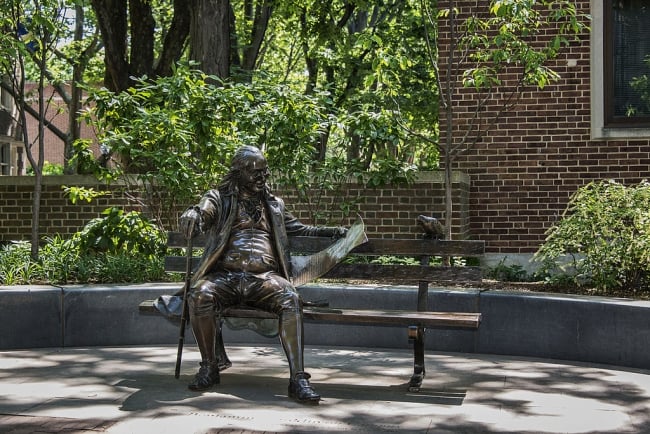You have /5 articles left.
Sign up for a free account or log in.

Ben Franklin statue on the University of Philadelphia campus.
John Greim/Contributor via Getty Images
More than 1,000 faculty and staff members at the University of Pennsylvania are calling on the Board of Trustees to pay a portion of what the university would owe in property taxes to the city of Philadelphia if the institution paid property taxes.
The payments in lieu of taxes, or PILOTs, being advocated would partly contribute to Philadelphia’s public education system, which faculty members say is sorely underfunded.
“Our public schools depend on property taxes,” Ann Farnsworth-Alvear, an associate professor of history at Penn, said during a press conference Tuesday. Philadelphia public schools receive about two-thirds of their funding from property tax revenue.
“The University of Pennsylvania is our city’s wealthiest nonprofit institution and a significant property owner,” Farnsworth-Alvear continued. “If UPenn does not shoulder its fair share, who is paying the difference? Well, other property owners pay that difference, including small businesses and homeowners who are poor.”
Nearly 1,200 faculty and staff members have signed the Penn for Pilots petition, which was sent to the Board of Trustees in July alongside requests for the board to meet with some of the signatories. As of Wednesday, the Board of Trustees had not responded to the signatories’ request.
The board is scheduled to meet this morning, but faculty say it’s unlikely that PILOTs will be discussed at the meeting.
Students at Penn have been pushing this issue for years with almost no response by the board. This is the first time so many faculty and staff members have joined the effort. During a press conference Tuesday, faculty members emphasized that PILOTs were a matter of equity and racial justice. [This paragraph has been updated to reflect this is the first effort by faculty and staff members at Penn.]
“What, in fact, are we educating children for if we are allowing them to go into unsafe buildings, buildings that have asbestos or lead paint. If we are challenging their teachers to teach in ways that could be affirming for students, but they don’t have the minimal facilities to be able to do that,” Vivian Gadsden, a professor of child development and education at Penn, said during the press conference.
If the university decided to make PILOTs, it’s unclear exactly how much it would pay each year. Penn doesn't pay property taxes because it's a nonprofit, but Penn for Pilots is asking the university to pay 40 percent of what it would owe in property taxes. Because Penn’s properties have not recently been assessed for tax purposes, the group does not have an accurate dollar estimate, though Farnsworth-Alvear speculated it would be about $40 million per year. She noted that the figure would be significantly lower than what the university would owe in property taxes to the city.
Penn has an endowment of more than $14.6 billion and owns $3.2 billion in property, according to The Philadelphia Inquirer. The difference in operating budgets between the university and Philadelphia public schools is staggering. For the 2019-20 school year, the school board introduced a $3.4 billion budget, up from $3.1 billion a year prior. In 2018, Penn and its university hospital spent $9.5 billion on operating expenses.
Philadelphia has been considered among the poorest large cities in the United States for years. It’s poverty rate is 24.5 percent, and more than 40 percent of households make $35,000 or less per year, according to PEW Charitable Trust. Forty percent of Philadelphia residents are Black.
Asked why the university doesn’t pay PILOTs, spokesman Ron Ozio pointed to the more than 500 Penn-supported activities going on in 248 Philadelphia schools.
“As the largest private employer in the City of Philadelphia, Penn and its affiliates contribute more to the City’s general fund through a multitude of tax payments than any other City-based employer -- not for profit or for profit,” Ozio wrote in an email. “Service is a key element of both the Penn Compact and the University’s mission. Through our community engagement initiatives, Penn actively supports the Philadelphia School District, not only in West Philadelphia but in every catchment area in the city.”
He also noted that the university hires local residents, makes purchases from locally owned and minority businesses and participates in a number of other community support efforts.
“We believe that the depth of Penn’s financial commitment and the breadth of programs we support has proven to be far more impactful than PILOTS have been in any city where they have been attempted,” Ozio wrote.
Eddie R. Cole, an associate professor of higher education and organizational change at the University of California, Los Angeles, highlighted why one-time initiatives and community outreach is not enough.
“The larger issue about Penn/private institutions and their responsibility to the public is historical. Like its other wealthy private urban peer institutions, such as Chicago and Columbia, Penn has long settled for being a half-partner in its community while reaping outsized public rewards,” Cole said in an email. “This is most evident in Penn’s role ushering in federal urban renewal programs that allowed universities to acquire property in the 1950s and 1960s that, today, is some of the most valuable in the city. All the while, those programs allowed institutions to displace long-time taxpaying and mostly Black households.”
Despite the university’s contributions to the city through jobs, hospitals and other services, the economic impact of the university’s property ownership is still significant.
“If anything, the PILOT proposal warrants a serious reflection on the past and would, at least, further acknowledge decades of wealth Penn and other universities have acquired as many of the city’s residents continue to struggle economically today,” Cole wrote.




